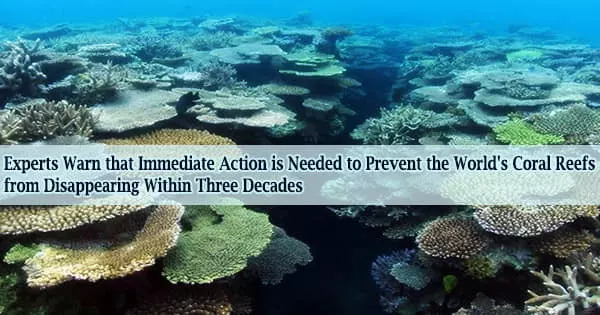A worldwide group of environmental experts has released a set of important suggestions for protecting, conserving, and studying the world’s coral reefs, which have been called the “canaries in the coal mine” of climate change.
On Thursday, the Vibrant Oceans Initiative released a white paper on the future of fragile and vital habitats at the Our Oceans Conference in Palau.
The committee draws on experience from universities and wildlife conservation groups around the world, including the University of Leicester, to offer six essential suggestions aimed at ensuring coral reefs’ ‘persistence and survival.’
If the Paris Agreement’s goals are not fulfilled, coral reef ecosystems around the world, which are home to millions of marine species and provide food, livelihoods, and cultural heritage for half a billion people, are expected to become functionally degraded by 2050.
Even if dramatic emission reductions are implemented to keep global warming below 1.5°C, up to 90% of the world’s corals might perish in the next three decades, leaving behind a reef structure that would lose many of its functions.
Jens Zinke, a Professor of Palaeobiology at the University of Leicester, studies huge coral habitats to trace environmental and climate change over the previous three centuries and into the present. Speaking about the report, of which he is a co-author, Professor Zinke said:
“Coral reefs are the ‘canaries in the coal mine’ when it comes to sensing ecosystems under stress from ocean warming due to climate change. Corals can sense when ocean temperatures exceed a dangerous threshold and warn us when we need to take measures.”
“Our research has shown that coral reefs have been severely impacted by ocean warming in the past three to four decades, yet some reef locations show lower rates of warming or benefit from mitigating circumstances due to local oceanography. Some reefs have the ability to resist or recover from thermal stress faster than others, and these reefs may serve as sanctuaries under future warming. This is a major new research direction to find those locations and protect them before they are gone.”
Coral reefs are the ‘canaries in the coal mine’ when it comes to sensing ecosystems under stress from ocean warming due to climate change. Corals can sense when ocean temperatures exceed a dangerous threshold and warn us when we need to take measures.
Jens Zinke
The Vibrant Oceans organization chose 50 reefs that are most likely to withstand and survive climate change in 2018. The ecosystems are primarily found in the Pacific and Indian oceans, with additional reefs found in the Caribbean and east Africa.
Previously, the 50 reefs were mostly chosen for their ability to withstand climate change. The scientists now advocate for a broader reef portfolio that includes resistant and fast-recovering reefs.
In the white paper ‘Forecasting Climate Sanctuaries for Securing the Future of Coral Reefs,’ the group makes the following recommendations:
- Keeping the 50 Reefs strategy as “climate change avoidance sanctuaries” as a top goal for coral reef conservation expenditure.
- Coral resistance and recovery sanctuaries will be added to the 50 Reefs protection portfolio in response to climate change.
- Increased funding for regional health assessments of the 50 Reefs portfolio and long-term finance measures to assist regional portfolio implementation.
- Catalyzing large-scale, data-driven coral reef monitoring operations in order to test and build new climate sanctuaries models and projections.
- Use of the most up-to-date climatic coral reef science to guide investments, especially as the effects of climate change worsen and new environmental pressures and responses emerge among reefs.
- Taking a broad approach to managing the 50 Reefs sites, including connections to larger seascapes, fisheries, and water quality management, and mitigation of other pressures (such as industrial development), so that effective and equitable management has measurable benefits for coral reefs and coastal communities.
The Wildlife Conservation Society (WCS) has a full copy of ‘Forecasting Climate Sanctuaries for Securing the Future of Coral Reefs’: https://wcs.org/coral-science-whitepaper
Bloomberg Philanthropies provided initial funding for the Vibrant Oceans project, while Oceans 5, the Paul G. Allen Family Foundation, and Tiffany & Co. Foundation continue to support ongoing conservation efforts.
The WCS, Rare, The Nature Conservancy, Blue Ventures, and the Conservation Ecosystem Partnership Fund are among the conservation partners.





